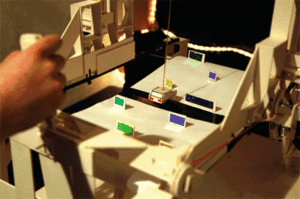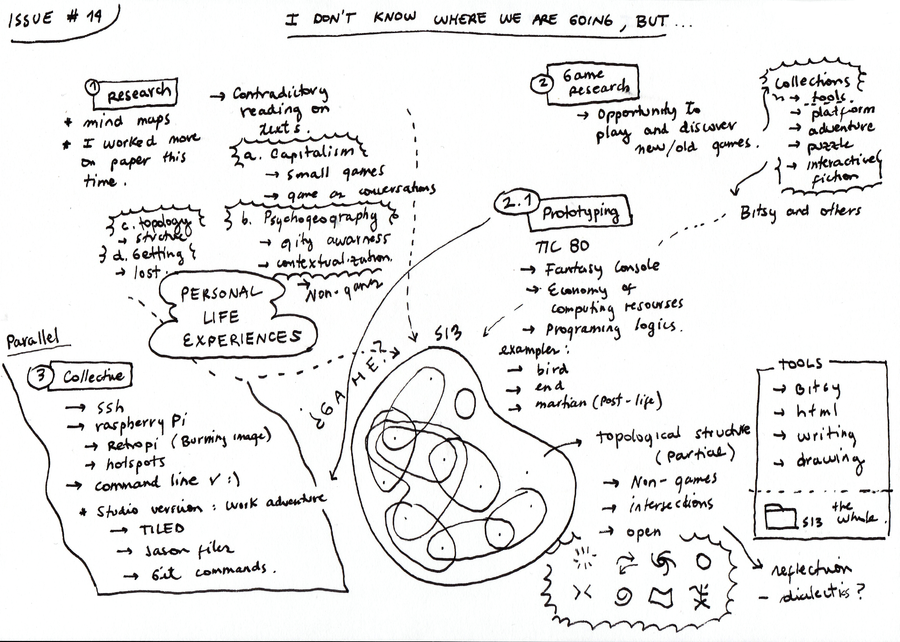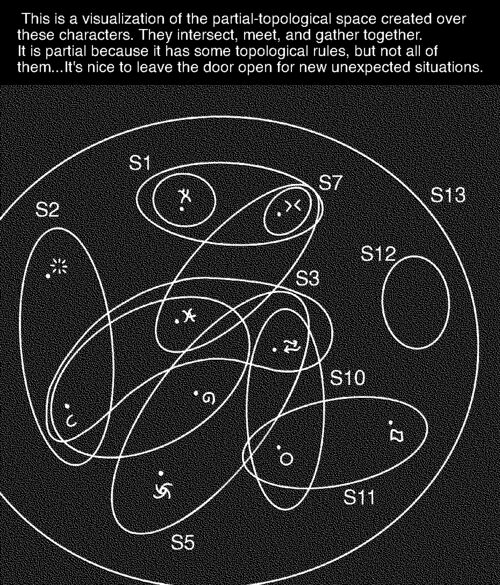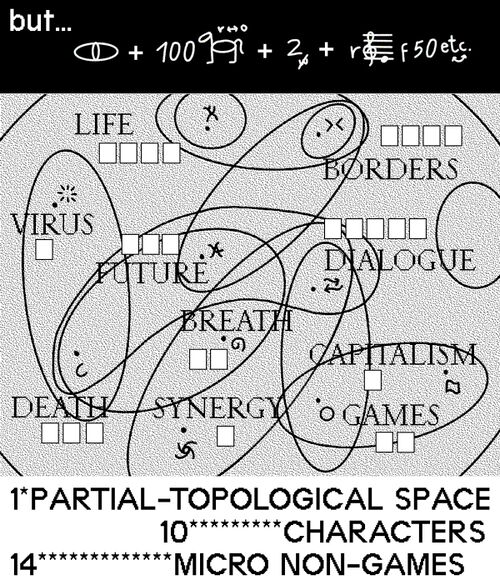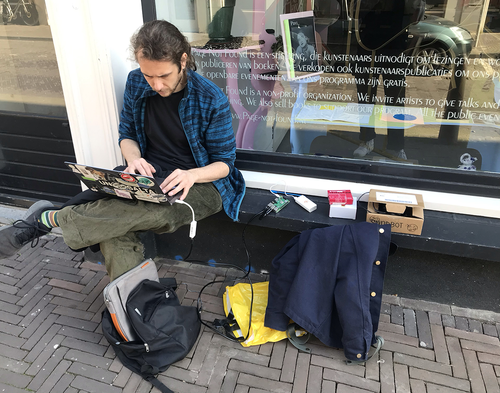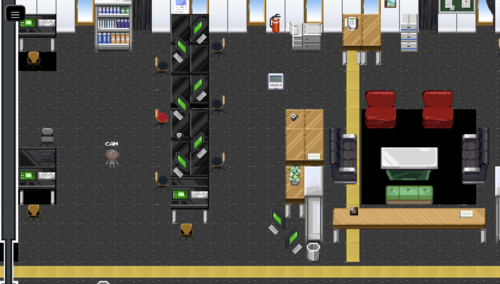User:Camilo/issue14: Difference between revisions
| Line 10: | Line 10: | ||
SPECIAL ISSUE 14 RESEARCH EXPLORATION | SPECIAL ISSUE 14 RESEARCH EXPLORATION | ||
1. THOUGHTS ON TOPOLOGY: | '''1. THOUGHTS ON TOPOLOGY:''' | ||
I used to hate topology when I was in high school. Today, I don't love it, but it is for sure super interesting to have a look at. A new fresh look I mean. I'm aware that I just take in count the very basics of it, but it's enough for my structural game purposes. | I used to hate topology when I was in high school. Today, I don't love it, but it is for sure super interesting to have a look at. A new fresh look I mean. I'm aware that I just take in count the very basics of it, but it's enough for my structural game purposes. | ||
| Line 132: | Line 132: | ||
As part of the personal research I wrote some reflections about personal experiences within the lenses of the issue. | As part of the personal research I wrote some reflections about personal experiences within the lenses of the issue. | ||
PAD: https://pad.xpub.nl/p/Writing | PAD: https://pad.xpub.nl/p/Writing | ||
=<p style="color:black; font-family: Alike Angular; font-weight: bold;"> GAME RESEARCH </p>= | =<p style="color:black; font-family: Alike Angular; font-weight: bold;"> GAME RESEARCH </p>= | ||
Revision as of 13:09, 12 April 2021
✸.
SUMMARY
RESEARCH
SPECIAL ISSUE 14 RESEARCH EXPLORATION 1. THOUGHTS ON TOPOLOGY: I used to hate topology when I was in high school. Today, I don't love it, but it is for sure super interesting to have a look at. A new fresh look I mean. I'm aware that I just take in count the very basics of it, but it's enough for my structural game purposes.
Topological space rules:
- 1. The empty set and X itself belong to τ.
- 2. Any arbitrary (finite or infinite) union of members of τ still belongs to τ.
- 3. The intersection of any finite number of members of τ still belongs to τ.
For me, the idea of topology space at the end suggests taking into count the empty space, the non-named or invisible, the whole as a unit, and of course all the possible relations between the elements of the space. A space that in a way involves synergy, encounter points and imagination.
Having this in mind, I wanted to experiment with a topological game place. I started thinking about a concrete topological space that worked with all the rules, and it was by itself complete. But then I realized that the idea of partial space could be a more open space to imagination, and just the sensibility of this ground for the game would suggest more non-created connections between them. Where the sets creating the topology were imagined by the player as well. A bit unrealistic but suggestive as a proposal. So, I decided to go with the Partial-Topological Space.
2. THOUGHTS ON GAMES:
- GAME AS A CONVERSATION:
Games are objects we can think with, and also they could be seen as interfaces between people. Conversations using clash, dance, computation, storytelling, text, movement, action, solitude. What are the qualities of a conversation? When this conversation stops being a representation and starts being a reality? The key point is: But Conversations that cannot be measured and are full of conflicts and failures.
- MICRO NON-GAMES:
Counter back capitalism by having in mind that for capitalism is important that the game is huge and fully measured by achievements, goals, and concrete awards.
3. THOUGHTS ON SITUATIONIST:
Regarding two readings: Both texts are pointing out failures, weaknesses of situationist practices that bring at the end this huge question of living the contradictions and the aimless quest to the purity of action...
1. Sex/gender-related: *a. Less than 10% were women and they have names: **• Michele Berstein **• Edith frey **• Jaqueline de Jong **• Katja Lindell **• Renné Nele **• Gretel Shadler **• Elena Verrone **• PLUS.. Every member's partner who supported them emotionally and economically **• it reminds me the Silvia Ferechi's phrase "that what you called love is unpaid labor"
Michele Berstein said: "Even situationist is sometimes the result of the way society is" … Contradiction: **• Overall they wanted to make a change in the world's behavior, a relation of power, and made explicit how this power creates separation and segregation, but they could miss that, in fact, that system of power is profoundly related to Sex and gender systems of power.
How did they? **• There were different aspects in which they tried to address this: **• MINOR DETOURMENT **• 1. Doing cut and paste using women's pictures from magazines of the 60's, reflecting on what, at that time, the society of spectacle wanted to convert women as a commodity. (from the bored house woman to the sexy woman) 1964 **• 2. Then through recontextualization and mixing them with texts that modify the meaning. **• Question: Doesn't this propagate the objetualization? In terms of reproducing the image that was once an object? 2. When it comes to derive: Psychogeography
Phsycogeography: **• The materiality of our experience of power such as: **⁃ Zones of residence **⁃ work **⁃ play **⁃ movements What was happening?: **• A man who went to prison twice for doing nothing more than observing the city, a lot of violent things were concretely happening and situationist remained abstract... **• LEADS TO>> Derive could end in a shallow non-sense tool if it's not contextualized and somehow grounded into the earth. This means, being aware of the context of each city through a specific body, the flaneur.
Contradiction: **• Propose a general derive to propose an international movement but being too abstract to face concrete problematics, which could be blind at the toxic shaping relationship between the city and the people such as racism, abuse of power...
CONTRADICTION: **• opposite ways **• a lack of purity? **• embracing the complexity of every aspect of life
My Glossary of Contradiction:
*• Affirmation *• Negation *• Dichotomy *• Negotiating *• Pull *• Push *• Opposition *• Antithetic *• Binary *• Wrong *• Way *• Direction *• Dialectic *• Paradox *• Metaphor
3. What's beyond two forces?
*• Janusian thinking *◦ Both at the same time. *• Systemic thinking, cybernetics. *◦ multidimensional, circular. *• Metaphoric thinking *• Divergent thinking
GAME AS A CONVERSATION: Games are objects we can think with, and also they could be seen as interfaces between people. Conversations using clash, dance, computation, storytelling, text, movement, action, solitude. What are the qualities of a conversation? When this conversation stops being a representation and starts being a reality? The key point is: But Conversations that cannot be measured and are full of conflicts and failures.
From Man, play and Games: Caillois quoting Huizinga talking about playing "It promotes the formation of social groupings which tend to surround themselves with secrecy and to stress their difference from the common world by disguise or other means." On gambling: "Property is exchanged, but no goods are produced" This fine line between being a player and a worker. when it comes to professionals players they aren't anymore players they are workers. Play only happens when the player has the desire to play on her own will. Playing is an option. Playing is isolated from time and space. Play involves agreements A game happens inside a pure space in which the confused and intricate laws of ordinary life are replaced.
Game enemies: Nihilist who denounces the rules as absurd and conventional, who refuses to play because the game is meaningless.
WRITING
As part of the personal research I wrote some reflections about personal experiences within the lenses of the issue. PAD: https://pad.xpub.nl/p/Writing
GAME RESEARCH
- Games itch.io:
- Interactive fiction: https://itch.io/c/1374258/interactive-fictions
- Platformer: https://itch.io/c/1383885/platformer
- Strategy: https://itch.io/c/1383890/strategy
- Puzzles: https://itch.io/c/1383892/puzzle
- Card Games:
- X: https://itch.io/c/1363166/x
- Games Steam:
- Games Are.na: https://www.are.na/camilo-garcia/games-wnqr9vi_ypo
- "How to Read the Situationist Times"
- Vandalist Interface: http://vandal.ist/thesituationisttimes/
- Glossary Situationist Pad: https://pad.xpub.nl/p/SituationistTimes_Glossary
- Glossary of the Pinball: https://en.wikipedia.org/wiki/Glossary_of_pinball_terms
- Martin & Jacopo Research: Research Wiki
- Contribution on the definition of play: https://www.cddc.vt.edu/sionline/si/play.html
- Glossary of games: Games
- Meeting interface: https://workadventu.re/
- Map-building: https://workadventu.re/map-building
BITSY
Intro: hi! bitsy is a little editor for little games or worlds. final file: HTML file Where? http://ledoux.io/bitsy/editor.html links
- Hacking Bitsy:
- Forum: https://ledoux.itch.io/bitsy/community
PROTOTYPING
Introduction
- Tool: TIC 80 /// Open source - Fantasy console /// [1]
- TIC-80 is a tiny computer which you can use to make, play, and share tiny games. Built-in development tools include code, sprite, map and sound editors which along with the command line tools, provide everything you need to create a mini retro game. Once your game is finished you can export it to a cartridge file, which can be stored and uploaded to the TIC-80 website. Alternatively, it can be packed into a stand-alone player that works on all popular platforms and can be distributed as you wish. To make a retro styled game, the whole process of creation takes place under some technical limitations: 240x136 pixels display, a 16 color palette, 256 8x8 color sprites, 4 channel sound, etc.
- TIC 80 man https://pad.xpub.nl/p/tic80-manual.md
- Wiki TIC80: [TIC80_WORKINPROGRESS]
TIC.80 IN
Pads:
- Session 1: https://pad.xpub.nl/p/2020-01-11-prototyping
- inside: Pico8 Zine(fantasy consoles), Game first selections
- Session 2: https://pad.xpub.nl/p/2020-01-18-prototyping
- inside: Tools, Lua Basics, publishing kit, examples.
- Session 3: https://pad.xpub.nl/p/2021-01-25-prototyping
- inside: Viseral facedes thoughts, tool for burning images, Retropie, function Rend Map(), AdjustScroll(), MInimal platform game(michel's example)
- Visceral Facades: https://pad.xpub.nl/p/visceralfacades
- Session 5: https://pad.xpub.nl/p/2021-02-01-prototyping
- inside: Lua for TIC80, save, import, get, sprites and text in lua.
- Session 6: https://pad.xpub.nl/p/2021-02-04-prototyping
- inside: Distribusi, Files, Minimal computer, Jinja templates, Download party.
- Session 7: https://pad.xpub.nl/p/2021-02-08-prototyping
- inside: workadventu.re map-building,
Links:
- Are.na: https://www.are.na/camilo-garcia/games-wnqr9vi_ypo
- Tools: https://github.com/everestpipkin/tools-list
- RetroPie: https://retropie.org.uk/download/
- Download toolkit:
- Video: $ youtube-dl https://youtube-dl.org/
- Web: $ wget
- General: https://wiki.archiveteam.org/index.php/Software
- Distribusi: https://pypi.org/project/distribusi/
TIC-80 on Sandbot:
To use sandbot TIC-80 / sandbot:
To save your work:
make sure you:
save MY WORK
if you type
ls
you should see "MYWORK.tic"
This file is actually in "local storage" -- saved in your browser (like a cookie). To export that to a downloadable file: https://hub.xpub.nl/sandbot/PrototypingTimes/tic80/save.html Click on the MYWORK.tic, and download it, 3. Upload MYWORK.tic to the sandbot and make an HTML page that links to it...
Later when you reload:
ls
load MYWORK
Publishing you TIC:
1. From the TIC-80 shell
https://hub.xpub.nl/sandbot/PrototypingTimes/tic80/tic80.html
save "YOURGAMENAME" then goto https://hub.xpub.nl/sandbot/PrototypingTimes/tic80/save.html and right click the YOURGAMENAME.tic file and choose to save link as... (downloads to your computer)
2. In your sandbot jupyter lab, navigate to shared/html/PrototypingTimes/tic80/2021-01-18/ Copy + paste maze.html and rename to YOURGAMENAME.html Drag + Drop your tic file Right-click the HTML page and choose Open in Editor. Change "maze.tic" to "YOURGAMENAME.tic"
3. Test if it works:
https://hub.xpub.nl/sandbot/PrototypingTimes/tic80/2021-01-18/
TIC.80 OUT
Tries
- Bird: https://hub.xpub.nl/sandbot/PrototypingTimes/tic80/2021-01-18/tic80.php?cart=bird1.tic
- Post-life:
- End:
GAME
Issue Wiki : Situationist Times
PROCESS
Files: File:SituationistTimes7.pdf
Pads:
- Session 1: https://pad.xpub.nl/p/05012021
- inside:
- Session 2: https://pad.xpub.nl/p/12012021
- inside:
- Session 3: https://pad.xpub.nl/p/19012021
- inside:
- Session 4: https://pad.xpub.nl/p/26012021
- inside:
- Session 5: https://pad.xpub.nl/p/02022021
- inside: Kendal's birthday, Counter play, mininmal play...
- Jamie Lecture: https://pad.xpub.nl/p/marxarcade
- Session 6: https://pad.xpub.nl/p/03022021
- inside: making Games in a Fucked Up World conversation, reading games, annotating games,
WIP
- 1 sentence Game ideas: https://pad.xpub.nl/p/gameideas
- on contradiction: On situationist thoughts: https://pad.xpub.nl/p/20_01_21_camilo
TOOLS
- Bisty
- HTML
- WRITING
- DRAWING
PARTIAL-TOPOLOGICAL SPACE
This personal project takes as a starting point the ideas of topology, drift, and dialectics, and builds a network of micro non-games that reflect on life, death, capitalism, virus, breathing, edges, synergy, games and the future.
The structure of the game experiments with the idea of Topology and proposes a set of non-games that have intersections and unions between them. In addition, it proposes an empty non-game and the possibility of obtaining a package with the whole game.
The project is conceived as a prolonged conversation in which it is easy to get lost, but which urges the curiosity to establish connections between its words.
GAMES: https://hub.xpub.nl/sandbot/PrototypingTimes/Partial-TopologicalSpace/
GAMES
'I DON'T KNOW WHERE WE ARE GOING, BUT'
S1. I don't know where we are going but... + (We can talk about it while we walk)
S2. I don't know where we are going but... + (We will meet in the middle)
S3. I don't know where we are going but... + (don't ask me to leave)
S4. I don't know where we are going but... + (is this real?)
S5. I don't know where we are going but... +(what about doing it together?)
S6. I don't know where we are going but. + (please, let's dance while we go)
S7. I don't know where we are going but.. + (are there more than two ways?)
S8. I don't know where we are going but... + (let's grow some thoughts over here)
S9. I don't know where we are going but... + (do we need to know?)
S10. I don't know where we are going but.. + (the less we know, the better the journey?)
S11. I don't know where we are going but... + (It is what it is, I guess)
S12. I don't know where we are going but... + (I don't really wanna know):
COLLECTIVE
Part of the Technical team:
Tools:
- ssh :)
- Raspberry Pi
- Setting up:
- Retro Pi
- Hotspost
- Command Line :)
- Work Adventure: Studio Version
- Link: https://play.workadventu.re/_/cww-ace-bpx/hub.xpub.nl/sandbot/PrototypingTimes/map/Floor1/floor2.json
- TILED
- Jason Files
- Git Commands

